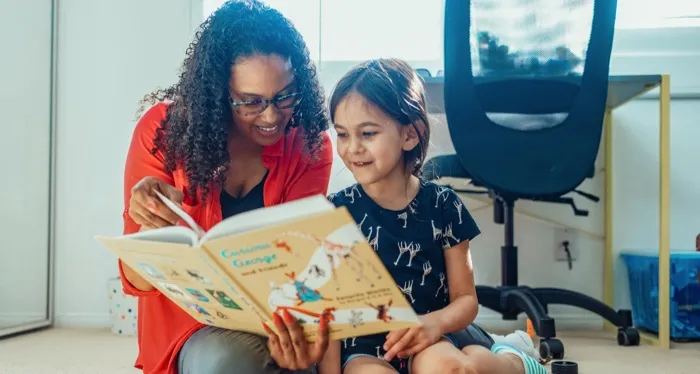
The Scientific Benefits of Reading to Children
If you’re here, chances are you know there are benefits of reading to children that go far beyond just the enjoyment of diving into a good book. In addition to relaxation, reading can provide cognitive and emotional benefits for readers of all ages. Regular reading can also help support attention spans, vocabulary growth, and the development of social-emotional skills.
While many readers recognize the perks of independent reading, parents, and caregivers are also tasked with helping young readers learn to access those benefits for themselves.
According to research done on children’s literacy by the University of Michigan, the benefits of reading to children translate into five essential skills:
1. Phonemic awareness — the ability to hear, identify, and play with individual sounds (phonemes) in spoken words
2. Phonics — the ability to connect the letters of written language with the sounds of spoken language
3. Vocabulary — words kids need to know to communicate effectively
4. Reading comprehension — the ability to understand and get meaning from what has been read
5. Fluency (oral reading) — ability to read text accurately and quickly
Reading and literacy in children. Reading and Literacy in Children | CS Mott Children’s Hospital | Michigan Medicine. (n.d.). Retrieved September 16, 2022, from https://www.mottchildren.org/posts/your-child/reading-and-literacy-children
These skills are vital in allowing a child to become a confident, independent reader. Parents and caregivers can help lay the foundation for success in these areas by reading aloud to children.
Reading to children has many benefits, starting from the newborn stage up to adolescence. According to the American Academy of Pediatrics, even before infants can talk, they can benefit from being read to daily. By introducing their babies early on to high-contrast picture books or stories with rhyming text, parents can help build knowledge of language patterns and introduce even very young children to the concept of a book as an object with a specific use. By learning to associate reading with enjoyment (even if that might involve chewing on, throwing, or otherwise playing with a book) in the early stages of development, children will develop a concept of reading as something humans do for enjoyment and to experience new things. This will help build a desire to listen to stories and, eventually, to read independently.
As children move toward the preschool years, the benefits of reading to them continue. Reading supports cognitive development, helps children to see problem-solving in action, and can promote parent-child bonding. Additionally, regular reading sessions allow children to be introduced to the language of books, and the written word, which often differs from what they hear in everyday conversations. This gives children the opportunity to build their vocabularies as well as begin to understand concepts of text structure and sequence, two important academic concepts for strengthening reading comprehension. Children who are regularly read to will have access to a wider variety of language as well as greater phonic awareness, two concepts that are foundationally important to learning to read on their own.
During a student’s school years, there are numerous benefits to continuing to read to a child, even as they progress toward independent reading. Not only does reading have the ability to reduce stress, but reading aloud also allows children to hear words and concepts that may be out of reach for them individually, but can be learned about with an adult. Children also benefit from dialogic reading, in which the adult reading asks questions to open up a conversation about the text, invites the child to read along with them, and/or uses reading as a way to investigate a new subject. These behaviors help model textual interaction for young readers, as well as give the opportunity for parents and children to discuss what they read together.
Even adolescents can benefit from family reading time, whether that takes place via read-aloud, audiobook, or dialogic reading and discussion of the different books being read. By modeling not only reading to children but also reading around children, parents can communicate that recreational reading is a tool for both relaxation and learning. Parents who might not consider themselves frequent readers can help support family literacy by listening to audiobooks on car rides or organizing trips to the public library. Reading also helps build a sense of empathy and allows young people who may be facing new or scary situations to find examples of how others have handled similar struggles in their lives. Particularly for teens, reading can provide a sense of consistency that helps them cope with the challenges of a new stage of life.
The wide variety of the benefits of reading to children shows why it is important for parents and caregivers to read to children and the necessity of making support for families a priority when it comes to literacy. Initiatives like better and more flexible access to public and school libraries, literacy information nights at schools, and distribution of free books from community reading programs can help ensure that a wider variety of children can access the benefits of reading and being read to across the lifespan.
Ready to start reading? Find all of our recommended children’s books here!


